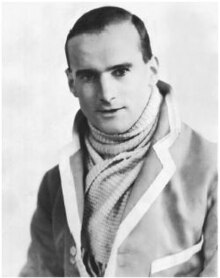This is an old revision of this page, as edited by Snow Blizzard (talk | contribs) at 15:45, 12 March 2012 (Reverted edits by 212.135.1.185 (talk) addition of unsourced negative content to a biographical article (HG)). The present address (URL) is a permanent link to this revision, which may differ significantly from the current revision.
Revision as of 15:45, 12 March 2012 by Snow Blizzard (talk | contribs) (Reverted edits by 212.135.1.185 (talk) addition of unsourced negative content to a biographical article (HG))(diff) ← Previous revision | Latest revision (diff) | Newer revision → (diff)| R. C. Sherriff | |
|---|---|
 | |
| Born | Robert Cedric Sherriff (1896-06-06)6 June 1896 Hampton Wick, Middlesex, England |
| Died | 13 November 1975(1975-11-13) (aged 79) Kingston upon Thames, England |
| Occupation | Playwright and screenwriter |
| Nationality | British |
| Period | early 1900s |
Robert Cedric Sherriff (6 June 1896 – 13 November 1975) was an English writer best known for his play Journey's End which was based on his experiences as a captain in World War I. He wrote several plays, novels, and screenplays, and was nominated for an Academy award and two BAFTA awards.
Early life
Sherriff was born in Hampton Wick, Middlesex, the only child of Herbert Hankin Sherriff, insurance clerk, and Constance Winder, daughter of Charles Winder, of Iver, Buckinghamshire. Educated at Kingston Grammar School in Kingston upon Thames, he worked in an insurance office as a clerk (from 1914) and as an insurance adjuster (1918 to 1928) at Sun Insurance Company, London. Sherriff served (1915 to 1918) as a captain in the 9th East Surrey Regiment in World War I, serving at Vimy and Loos. He was severely wounded at Passchendaele near Ypres in 1917. He was awarded the Military Cross during the war.
Sherriff studied at New College, Oxford from 1931 to 1934. He was a fellow of the Royal Society of Literature and the Society of Antiquaries of London.
Career
Playwright
He first wrote a play to help Kingston Rowing Club raise money to buy a new boat. His seventh play, Journey's End, was written in 1928 and published in 1929 and was based on his experiences in the war. It was given a single Sunday performance, on 9 December 1928, by the Incorporated Stage Society at the Apollo Theatre, directed by James Whale and with the 21-year-old Laurence Olivier in the lead role. In the audience was Maurice Browne who produced it at the Savoy Theatre where it was performed for two years from 1929.
Novelist
Sherriff also wrote prose. His own novelised version of Journey's End was published in 1929. His 1939 novel, The Hopkins Manuscript is an H. G. Wells-influenced post-apocalyptic story about an earth devastated because of a collision with the Moon. Its sober language and realistic depiction of an average man coming to terms with a ruined England is said to have been an influence on later science fiction authors such as John Wyndham and Brian Aldiss.
Award nominations
Sherriff was nominated along with Eric Maschwitz and Claudine West for an Academy award for writing an adapted screenplay for Goodbye, Mr. Chips which was released in 1939. His 1955 screenplays, The Dam Busters and The Night My Number Came Up were nominated for best British screenplay BAFTA awards.
Work
Plays
- 1921: A Hitch in the Proceedings
- 1922: The Woods of Meadowside
- 1923: Profit and Loss
- 1924: Cornlow-in-the-Downs
- 1926: Mr. Bridie's Finger
- 1928: Journey's End
- 1930: Badger's Green
- 1933: Windfall
- 1934: Two Hearts Doubled
- 1936: St Helena
- 1948: Miss Mabel
- 1949: Dark Evening
- 1950: Home at Seven
- 1952: The Kite
- 1953: The White Carnation
- 1955: The Long Sunset
- 1957: The Telescope
- 1961: A shred of evidence
Film scripts
- 1933: The Invisible Man
- 1933: Goodbye, Mr. Chips
- 1934: One More River
- 1937: The Road Back
- 1939: The Four Feathers
- 1941: Lady Hamilton
- 1942: This Above All
- 1945: Odd Man Out
- 1948: Quartet
- 1950: No Highway
- 1955: The Dam Busters
- 1955: The Night My Number Came Up
- 1955: Cards with Uncle Tom (TV)
- 1963: The Ogburn Story (TV)
Books
- Journey's End: A Novel (with Vernon Bartlett). London: Gollancz. 1930. OCLC 4072239.
- The Fortnight in September. 1931. OCLC 246884057. (Reprinted in 2006 by Persephone Books)
- The Hopkins Manuscript. 1939. OCLC 2212270. (Revised and reissued as a Pan Paperback in 1958 under the title "The Cataclysm"; Reprinted in 2005 by Persephone Books)
- Chedworth: A Novel. 1944. OCLC 761913.
- Another Year: A Novel. 1948. OCLC 1455916.
- King John's Treasure. 1954. OCLC 31122994.
- The Wells of St. Mary's. 1962. OCLC 7185868.
- The Siege of Swayne Castle. 1973. ISBN 0575017228.
- No Leading Lady: An Autobiography. London: Victor Gollancz Ltd. 1968. ISBN 0575001550.
References
- ^ UK Public Records Office, BDM Certificates
- Sheriff (1968), pp. 14, 22
- Glancy, H. M. (2008). "Writers and Production Artists: R. C. Sherriff". film reference. Retrieved 5 November 2008.
- Sherriff, Robert Cedric (1968). No leading lady: an autobiography. London: Victor Gollancz Ltd. ISBN 0575001550.
External links
- Sherriff's literary agents
- Please use a more specific IBDB template. See the documentation for available templates.
- R. C. Sherriff at IMDb
- The Man from Esher and his Theatre of War
Categories:
- Use dmy dates from September 2010
- 1896 births
- 1975 deaths
- Artists' Rifles soldiers
- British Army personnel of World War I
- East Surrey Regiment officers
- English dramatists and playwrights
- English novelists
- English screenwriters
- Fellows of the Royal Society of Literature
- Fellows of the Society of Antiquaries of London
- People from Kingston upon Thames
- Recipients of the Military Cross
- War writers
- Alumni of New College, Oxford
- People educated at Kingston Grammar School